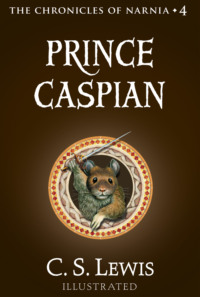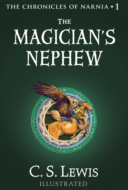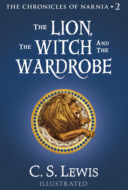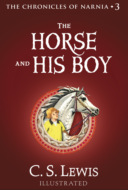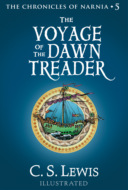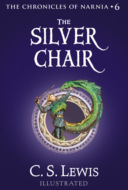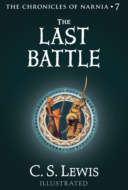Kitap dosya olarak indirilemez ancak uygulamamız üzerinden veya online olarak web sitemizden okunabilir.
Kitabı oku: «Prince Caspian»
Illustrated by Pauline Baynes

To Mary Clare Havard


PRINCE CASPIAN
A young prince must fight for his stolen throne.
NARNIA. . the land beyond the lamp-post where wondrous things happen, where the Lion returns. . where a battle is about to begin.
An evil king sits on the throne of Narnia, forcing all the Talking Beasts and mythical creatures to live in hiding. The rightful king, the young Prince Caspian, fights desperately to regain his throne and save his people. But when all seems lost the Great Lion, Aslan, calls Peter, Susan, Edmund and Lucy, four heroes from another world, to join the battle to free Narnia.

Chapter One
The Island
Once there were four children whose names were Peter, Susan, Edmund and Lucy, and it has been told in another book called The Lion, the Witch and the Wardrobe how they had a remarkable adventure. They had opened the door of a magic wardrobe and found themselves in a quite different world from ours, and in that different world they had become Kings and Queens in a country called Narnia. While they were in Narnia they seemed to reign for years and years; but when they came back through the door and found themselves in England again, it all seemed to have taken no time at all. At any rate, no one noticed that they had ever been away, and they never told anyone except one very wise grown-up.
That had all happened a year ago, and now all four of them were sitting on a seat at a railway station with trunks and playboxes piled up round them. They were, in fact, on their way back to school. They had travelled together as far as this station, which was a junction; and here, in a few minutes, one train would arrive and take the girls away to one school, and in about half an hour another train would arrive and the boys would go off to another school. The first part of the journey, when they were all together, always seemed to be part of the holidays; but now when they would be saying goodbye and going different ways so soon, everyone felt that the holidays were really over and everyone felt their term-time feelings beginning again, and they were all rather gloomy and no one could think of anything to say. Lucy was going to boarding school for the first time.
It was an empty, sleepy, country station and there was hardly anyone on the platform except themselves. Suddenly Lucy gave a sharp little cry, like someone who has been stung by a wasp.
“What’s up, Lu?” said Edmund – and then suddenly broke off and made a noise like “Ow!”
“What on earth—” began Peter, and then he too suddenly changed what he had been going to say. Instead, he said, “Susan, let go! What are you doing? Where are you dragging me to?”
“I’m not touching you,” said Susan. “Someone is pulling me. Oh – oh – oh – stop it!”
Everyone noticed that all the others’ faces had gone very white.
“I felt just the same,” said Edmund in a breathless voice. “As if I were being dragged along. A most frightful pulling – ugh! It’s beginning again.”
“Me too,” said Lucy. “Oh, I can’t bear it.”
“Look sharp!” shouted Edmund. “All catch hands and keep together. This is magic – I can tell by the feeling. Quick!”
“Yes,” said Susan. “Hold hands. Oh, I do wish it would stop – oh!”
Next moment the luggage, the seat, the platform, and the station had completely vanished. The four children, holding hands and panting, found themselves standing in a woody place – such a woody place that branches were sticking into them and there was hardly room to move. They all rubbed their eyes and took a deep breath.
“Oh, Peter!” exclaimed Lucy. “Do you think we can possibly have got back to Narnia?”
“It might be anywhere,” said Peter. “I can’t see a yard in all these trees. Let’s try to get into the open – if there is any open.”
With some difficulty, and with some stings from nettles and pricks from thorns, they struggled out of the thicket. Then they had another surprise. Everything became much brighter, and after a few steps they found themselves at the edge of the wood, looking down on a sandy beach. A few yards away a very calm sea was falling on the sand with such tiny ripples that it made hardly any sound. There was no land in sight and no clouds in the sky. The sun was about where it ought to be at ten o’clock in the morning, and the sea was a dazzling blue. They stood sniffing in the sea-smell.
“By Jove!” said Peter. “This is good enough.”
Five minutes later everyone was barefooted and wading in the cool clear water.
“This is better than being in a stuffy train on the way back to Latin and French and Algebra!” said Edmund. And then for quite a long time there was no more talking, only splashing and looking for shrimps and crabs.
“All the same,” said Susan presently, “I suppose we’ll have to make some plans. We shall want something to eat before long.”
“We’ve got the sandwiches Mother gave us for the journey,” said Edmund. “At least I’ve got mine.”
“Not me,” said Lucy. “Mine were in my little bag.”
“So were mine,” said Susan.
“Mine are in my coat pocket, there on the beach,” said Peter. “That’ll be two lunches among four. This isn’t going to be such fun.”
“At present,” said Lucy, “I want something to drink more than something to eat.”
Everyone else now felt thirsty, as one usually is after wading in salt water under a hot sun.
“It’s like being shipwrecked,” remarked Edmund. “In the books they always find springs of clear, fresh water on the island. We’d better go and look for them.”
“Does that mean we have to go back into all that thick wood?” said Susan.
“Not a bit of it,” said Peter. “If there are streams they’re bound to come down to the sea, and if we walk along the beach we’re bound to come to them.”
They all now waded back and went first across the smooth, wet sand and then up to the dry, crumbly sand that sticks to one’s toes, and began putting on their shoes and socks. Edmund and Lucy wanted to leave them behind and do their exploring with bare feet, but Susan said this would be a mad thing to do. “We might never find them again,” she pointed out, “and we shall want them if we’re still here when night comes and it begins to be cold.”
When they were dressed again they set out along the shore with the sea on their left hand and the wood on their right. Except for an occasional seagull it was a very quiet place. The wood was so thick and tangled that they could hardly see into it at all; and nothing in it moved – not a bird, not even an insect.
Shells and seaweed and anemones, or tiny crabs in rock-pools, are all very well, but you soon get tired of them if you are thirsty. The children’s feet, after the change from the cool water, felt hot and heavy. Susan and Lucy had raincoats to carry. Edmund had put down his coat on the station seat just before the magic overtook them, and he and Peter took it in turns to carry Peter’s great-coat.
Presently the shore began to curve round to the right. About quarter of an hour later, after they had crossed a rocky ridge which ran out into a point, it made quite a sharp turn. Their backs were now to the part of the sea which had met them when they first came out of the wood, and now, looking ahead, they could see across the water another shore, thickly wooded like the one they were exploring.
“I wonder, is that an island or do we join on to it presently?” said Lucy.
“Don’t know,” said Peter and they all plodded on in silence.
The shore that they were walking on drew nearer and nearer to the opposite shore, and as they came round each promontory the children expected to find the place where the two joined. But in this they were disappointed. They came to some rocks which they had to climb and from the top they could see a fair way ahead and – “Oh, bother!” said Edmund. “It’s no good. We shan’t be able to get to those other woods at all. We’re on an island!”
It was true. At this point the channel between them and the opposite coast was only about thirty or forty yards wide, but they could now see that this was its narrowest place. After that, their own coast bent round to the right again and they could see open sea between it and the mainland. It was obvious that they had already come much more than halfway round the island.

“Look!” said Lucy suddenly. “What’s that?” She pointed to a long, silvery, snake-like thing that lay across the beach.
“A stream! A stream!” shouted the others, and, tired as they were, they lost no time in clattering down the rocks and racing to the fresh water. They knew that the stream would be better to drink farther up, away from the beach, so they went at once to the spot where it came out of the wood. The trees were as thick as ever, but the stream had made itself a deep course between high mossy banks so that by stooping you could follow it up in a sort of tunnel of leaves. They dropped on their knees by the first brown, dimply pool and drank and drank, and dipped their faces in the water, and then dipped their arms in up to the elbow.
“Now,” said Edmund, “what about those sandwiches?”
“Oh, hadn’t we better save them?” said Susan. “We may need them far worse later on.”
“I do wish,” said Lucy, “now that we’re not thirsty, we could go on feeling as not-hungry as we did when we were thirsty.”
“But what about those sandwiches?” repeated Edmund. “There’s no good saving them till they go bad. You’ve got to remember it’s a good deal hotter here than in England and we’ve been carrying them about in pockets for hours.” So they got out the two packets and divided them into four portions, and nobody had quite enough, but it was a great deal better than nothing. Then they talked about their plans for the next meal. Lucy wanted to go back to the sea and catch shrimps, until someone pointed out that they had no nets. Edmund said they must gather gulls’ eggs from the rocks, but when they came to think of it they couldn’t remember having seen any gulls’ eggs and wouldn’t be able to cook them if they found any. Peter thought to himself that unless they had some stroke of luck they would soon be glad to eat eggs raw, but he didn’t see any point in saying this out loud. Susan said it was a pity they had eaten the sandwiches so soon. One or two tempers very nearly got lost at this stage. Finally Edmund said:
“Look here. There’s only one thing to be done. We must explore the wood. Hermits and knights-errant and people like that always manage to live somehow if they’re in a forest. They find roots and berries and things.”
“What sort of roots?” asked Susan.
“I always thought it meant roots of trees,” said Lucy.
“Come on,” said Peter, “Ed is right. And we must try to do something. And it’ll be better than going out into the glare and the sun again.”
So they all got up and began to follow the stream. It was very hard work. They had to stoop under branches and climb over branches, and they blundered through great masses of stuff like rhododendrons and tore their clothes and got their feet wet in the stream; and still there was no noise at all except the noise of the stream and the noises they were making themselves. They were beginning to get very tired of it when they noticed a delicious smell, and then a flash of bright colour high above them at the top of the right bank.
“I say!” exclaimed Lucy. “I do believe that’s an apple tree.”

It was. They panted up the steep bank, forced their way through some brambles, and found themselves standing round an old tree that was heavy with large yellowish-golden apples as firm and juicy as you could wish to see.
“And this is not the only tree,” said Edmund with his mouth full of apple. “Look there – and there.”
“Why, there are dozens of them,” said Susan, throwing away the core of her first apple and picking her second. “This must have been an orchard – long, long ago, before the place went wild and the wood grew up.”
“Then this was once an inhabited island,” said Peter.
“And what’s that?” said Lucy, pointing ahead. “By Jove, it’s a wall,” said Peter. “An old stone wall.”
Pressing their way between the laden branches they reached the wall. It was very old, and broken down in places, with moss and wallflowers growing on it, but it was higher than all but the tallest trees. And when they came quite close to it they found a great arch which must once have had a gate in it but was now almost filled up with the largest of all the apple trees. They had to break some of the branches to get past, and when they had done so they all blinked because the daylight became suddenly much brighter. They found themselves in a wide open place with walls all round it. In here there were no trees, only level grass and daisies, and ivy, and grey walls. It was a bright, secret, quiet place, and rather sad; and all four stepped out into the middle of it, glad to be able to straighten their backs and move their limbs freely.
Chapter Two
The Ancient Treasure House
“This wasn’t a garden,” said Susan presently. “It was a castle and this must have been the courtyard.”
“I see what you mean,” said Peter. “Yes. That is the remains of a tower. And there is what used to be a flight of steps going up to the top of the walls. And look at those other steps – the broad, shallow ones – going up to that doorway. It must have been the door into the great hall.”
“Ages ago, by the look of it,” said Edmund.
“Yes, ages ago,” said Peter. “I wish we could find out who the people were that lived in this castle; and how long ago.”
“It gives me a queer feeling,” said Lucy. “Does it, Lu?” said Peter, turning and looking hard at her. “Because it does the same to me. It is the queerest thing that has happened this queer day. I wonder where we are and what it all means?”
While they were talking they had crossed the courtyard and gone through the other doorway into what had once been the hall. This was now very like the courtyard, for the roof had long since disappeared and it was merely another space of grass and daisies, except that it was shorter and narrower and the walls were higher. Across the far end there was a kind of terrace about three feet higher than the rest.
“I wonder, was it really the hall?” said Susan. “What is that terrace kind of thing?”
“Why, you silly,” said Peter (who had become strangely excited), “don’t you see? That was the dais where the High Table was, where the King and the great lords sat. Anyone would think you had forgotten that we ourselves were once Kings and Queens and sat on a dais just like that, in our great hall.”
“In our castle of Cair Paravel,” continued Susan in a dreamy and rather sing-song voice, “at the mouth of the great river of Narnia. How could I forget?”
“How it all comes back!” said Lucy. “We could pretend we were in Cair Paravel now. This hall must have been very like the great hall we feasted in.”
“But unfortunately without the feast,” said Edmund. “It’s getting late, you know. Look how long the shadows are. And have you noticed that it isn’t so hot?”
“We shall need a camp-fire if we’ve got to spend the night here,” said Peter. “I’ve got matches. Let’s go and see if we can collect some dry wood.”
Everyone saw the sense of this, and for the next half-hour they were busy. The orchard through which they had first come into the ruins turned out not to be a good place for firewood. They tried the other side of the castle, passing out of the hall by a little side door into a maze of stony humps and hollows which must once have been passages and smaller rooms but was now all nettles and wild roses. Beyond this they found a wide gap in the castle wall and stepped through it into a wood of darker and bigger trees where they found dead branches and rotten wood and sticks and dry leaves and fir-cones in plenty. They went to and fro with bundles until they had a good pile on the dais. At the fifth journey they found the well, just outside the hall, hidden in weeds, but clean and fresh and deep when they had cleared these away. The remains of a stone pavement ran halfway round it. Then the girls went out to pick some more apples and the boys built the fire, on the dais and fairly close to the corner between two walls, which they thought would be the snuggest and warmest place. They had great difficulty in lighting it and used a lot of matches, but they succeeded in the end. Finally, all four sat down with their backs to the wall and their faces to the fire. They tried roasting some of the apples on the ends of sticks. But roast apples are not much good without sugar, and they are too hot to eat with your fingers till they are too cold to be worth eating. So they had to content themselves with raw apples, which, as Edmund said, made one realize that school suppers weren’t so bad after all – “I shouldn’t mind a good thick slice of bread and margarine this minute,” he added. But the spirit of adventure was rising in them all, and no one really wanted to be back at school.
Shortly after the last apple had been eaten, Susan went out to the well to get another drink. When she came back she was carrying something in her hand.

“Look,” she said in a rather choking kind of voice.
“I found it by the well.” She handed it to Peter and sat down. The others thought she looked and sounded as if she might be going to cry. Edmund and Lucy eagerly bent forward to see what was in Peter’s hand – a little, bright thing that gleamed in the firelight.
“Well, I’m – I’m jiggered,” said Peter, and his voice also sounded queer. Then he handed it to the others.
All now saw what it was – a little chess-knight, ordinary in size but extraordinarily heavy because it was made of pure gold; and the eyes in the horse’s head were two tiny little rubies – or rather one was, for the other had been knocked out.
“Why!” said Lucy. “It’s exactly like one of the golden chessmen we used to play with when we were Kings and Queens at Cair Paravel.”
“Cheer up, Su,” said Peter to his other sister.
“I can’t help it,” said Susan. “It brought back – oh, such lovely times. And I remembered playing chess with fauns and good giants, and the mer-people singing in the sea, and my beautiful horse – and – and—”
“Now,” said Peter in a quite different voice, “it’s about time we four started using our brains.”
“What about?” asked Edmund.
“Have none of you guessed where we are?” said Peter.
“Go on, go on,” said Lucy. “I’ve felt for hours that there was some wonderful mystery hanging over this place.”
“Fire ahead, Peter,” said Edmund. “We’re all listening.”
“We are in the ruins of Cair Paravel itself,” said Peter.
“But, I say,” replied Edmund. “I mean, how do you make that out? This place has been ruined for ages. Look at all those big trees growing right up to the gates. Look at the very stones. Anyone can see that nobody has lived here for hundreds of years.”
“I know,” said Peter. “That is the difficulty. But let’s leave that out for the moment. I want to take the points one by one. First point: this hall is exactly the same shape and size as the hall at Cair Paravel. Just picture a roof on this, and a coloured pavement instead of grass, and tapestries on the walls, and you get our royal banqueting hall.”
No one said anything.
“Second point,” continued Peter. “The castle well is exactly where our well was, a little to the south of the great hall; and it is exactly the same size and shape.”
Again there was no reply.
“Third point: Susan has just found one of our old chessmen – or something as like one of them as two peas.”
Still nobody answered.
“Fourth point. Don’t you remember – it was the very day before the ambassadors came from the King of Calormen – don’t you remember planting the orchard outside the north gate of Cair Paravel? The greatest of all the wood-people, Pomona herself, came to put good spells on it. It was those very decent little chaps, the moles, who did the actual digging. Can you have forgotten that funny old Lilygloves, the chief mole, leaning on his spade and saying, ‘Believe me, your Majesty, you’ll be glad of these fruit trees one day.’ And by Jove he was right.”
“I do! I do!” said Lucy, and clapped her hands.
“But look here, Peter,” said Edmund. “This must be all rot. To begin with, we didn’t plant the orchard slap up against the gate. We wouldn’t have been such fools.”
Ücretsiz ön izlemeyi tamamladınız.
